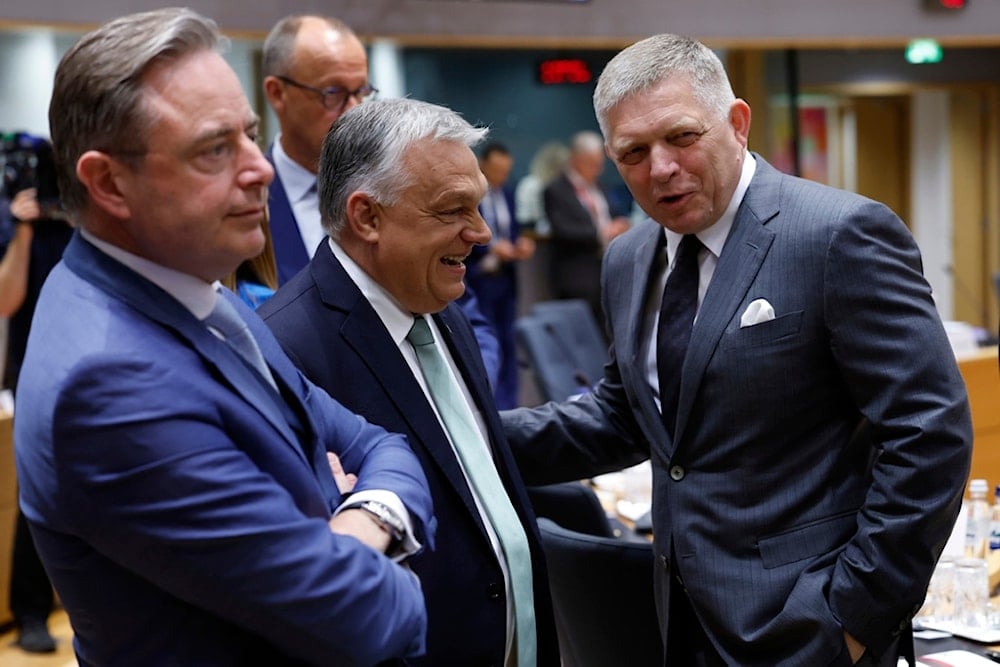Slovakia threatens to block new EU sanctions over Russian energy
Slovakia warns it will block EU sanctions on Russia, citing energy costs, gas transit fees, and a potential €20B lawsuit from Gazprom if imports are halted.
-

From left, Belgium's Prime Minister Bart De Wever, Hungary's Prime Minister Viktor Orban and Slovakia's Prime Minister Robert Fico attend a round table meeting at an EU summit in Brussels, Thursday, June 26, 2025 (AP)
Slovak Prime Minister Robert Fico harshly criticized the European Union’s energy policy on Saturday, warning that the bloc's planned phase-out of Russian energy imports would severely harm Slovakia’s economy and undermine EU competitiveness.
In a televised appearance, Fico likened the EU’s approach to “shooting ourselves in the knee,” warning that high energy prices already threaten the bloc’s industrial edge.
“We have a competitiveness problem and high prices for electricity and gas, and we are going to make another harmful ideological decision because of the obsession with Russia,” he said, adding that Slovakia, located at the end of major pipeline routes, would bear the brunt of the impact.
Slovakia threatens to block 18th EU sanctions package
Fico also reiterated on Friday that Slovakia would not approve the EU’s 18th sanctions package against Russia unless the bloc addressed specific national concerns. These include potential hikes in transit fees, compensation for Slovak households, and a likely surge in gas prices if Russian imports are cut off starting January 2028.
The Slovak premier warned that if Slovakia unilaterally cancels its energy agreement with Gazprom, the Russian energy giant could sue Bratislava for €20 billion ($23.4 billion).
Hungary, Slovakia push back against Brussels
The European Commission has acknowledged the validity of Slovakia's concerns, Fico noted, but has yet to offer a comprehensive resolution. The dispute places pressure on Brussels to balance its anti-Russia policy goals with the economic interests of vulnerable EU member states.
Earlier in the week, EU foreign policy chief Kaja Kallas indicated that the sanctions package could be approved by the end of the week.
However, Hungarian Foreign Minister Peter Szijjarto confirmed that both Hungary and Slovakia had blocked the sanctions due to concerns over proposed exemptions that would prevent them from buying Russian oil and gas, an issue Budapest and Bratislava claim violates established EU procedures.
Zelensky wants lower price cap on Russian oil
Ukrainian President Volodymyr Zelensky has called on the European Union to sharply lower its price cap on Russian oil, voicing frustration over the enduring dependence of certain EU member states on energy imports from Moscow. His comments come amid ongoing negotiations over the bloc's 18th sanctions package against Russia.
Speaking before the European Council on Thursday, Zelensky stated, "Over time, we have seen how strong some European countries still depend on Russian oil, and we really understand this and we act carefully, as our partnership with the EU requires. Yet, sadly, we don't always feel the same understanding in return when it comes to Ukraine's needs. It feels especially strange to hear such strong criticism, even political pressure from some leaders, while our respect of EU rules allows oil to keep flowing."
He urged the EU to act decisively by reducing the oil price cap to $30 per barrel, or at least $45, a move Kiev believes could significantly diminish Russian revenue streams that fund the war effort.
Energy divide
The debate underscores widening divisions within the EU over energy strategy. While countries like Poland and the Baltic states support more aggressive measures, others fear the economic consequences of a complete decoupling from Russian energy. Hungary and Slovakia, for example, still rely on Russian crude for over 80% of their oil imports, facilitated through pipeline contracts that remain exempt from current EU embargoes.
The European Commission has sought to address this imbalance through its REPowerEU strategy, introduced in 2022. A roadmap published in May 2025 outlines plans to ban Russian energy imports under new and spot contracts by the end of this year and fully eliminate Russian fossil fuel imports, including long-term pipeline and LNG contracts, by the close of 2027.
Yet despite EU efforts to tighten sanctions, Russia has shown resilience. It has rerouted oil exports to Asia, particularly China, India, and Turkey, and operates a vast "shadow fleet" of over 1,100 tankers to circumvent Western tracking and insurance mechanisms. These tactics have helped Moscow keep its oil revenues flowing despite price caps and embargoes.

 4 Min Read
4 Min Read









